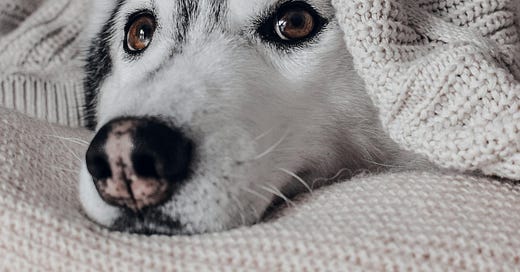DR. NATASHA P. RUSSELL
As a veterinarian who focuses on the medicine that I can prevent instead of the medicine that I can provide, I thought that restful nights' may be a good place to start this series. Early detection of changes happening in the body is key and I’m hoping that this will be an easy way for any pet family to "check in" and be on the lookout for abnormal changes.
There's a lot of information about one's general health when we look at resting routines. Over the next few nights, let's start by paying special attention to our pet’s nighttime activities (or, hopefully, lack thereof).
A restful night should be a restorative time, without a lot of activity. If you’re noticing frequent physical shifting, increased bedtime sounds (sighing, whining, snoring or coughing, to name a few), pee or poop breaks, or even nocturnal trips to the water bowl… These symptoms are not considered normal.
Unfortunately, these extra nighttime activities may be early indicators that something in the natural balance of the body is amiss. Shifting pets who seem uncomfortable in many positions may have circulation issues (red blood cells, heart, and/or lung), breathing/airway issues, or even sore joints caused by progressing osteoarthritis, to name a few of the top medical offenders to rule out.
Sighing and whining may indicate chronic stress or an anxiety disorder (due to general needs not being met). Snoring may indicate the need for weight loss or the worsening of an obstructive airway disorder. For all senior pets and/or pets with chronic conditions, I recommend periodically checking in on their Sleeping Respiration Rate (SRR) — anything over 30 warrants some close monitoring and a conversation with your family vet. Instructions on how to best do this can be found online.
The need to empty the bowels or urinary bladder during sleep hours is not normal. I mean, all dog caregivers everywhere have had to clean up diarrhea at 2 am after our doggos got into something that they shouldn’t have (or maybe we shared something with them that we shouldn’t have). But this should be rare, and never daily.
The need to drink an excess of water means that our pets will also need many more bathroom breaks, even suffer from inappropriate urination or urinary accidents inside the home. It will be very important for your veterinary team to rule out which causes are treatable (salty diet/treats, UTIs) and which will need long-term medical management ASAP, like diabetes and declining kidney function. After all, early detection and intervention will allow for more success in our initial treatment attempts and prevent more expensive vet bills and heartaches down the road.
Until next time!
Your Community Vet




